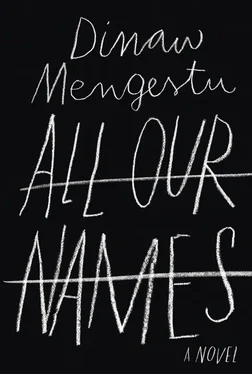In the scripted version that had played in my head during the five-minute drive from Isaac’s apartment to the restaurant, the entire diner fell silent as soon as we entered. All eyes turned toward us, and we ignored them. We didn’t hold hands — that would have been too provocative — but we did pause to look at each other with what I thought of as an abundance of affection. In the version we lived, no one stopped talking. Bill saw me as soon as I walked in and pointed to a table in the middle of the diner. Isaac followed me, but I was so focused on making it to the table that I never stopped to notice if anyone was staring at him. We took our seats. When I picked up my menu as a cover so I could look around the room, I realized no one had noticed yet how remarkable we were.
Isaac saw my gaze wandering. “Why are we here?” he asked me.
I looked around the room again. I thought I saw Bill and two of the men at the counter staring in our general direction.
“No particular reason,” I told him. “I just wanted to get out.”
I asked Isaac what he had done all day.
“I was at the library,” he said.
He described the book on contemporary American architecture he had been reading. I told him twice that it sounded very interesting. “Fascinating,” I said, “what they can build these days.” Chitchat. Simple conversation. When Isaac put his hand on the table, I took his pinky and index finger in mine. I held them for two, maybe three seconds while looking at the menu. I used a strand of loose hair as an excuse to let go.
Our waitress came and took our order. I ordered the fried chicken; Isaac pointed to the Denver omelet and let me order for him.
After our waitress left, I turned my attention back to the counter. I wanted to tell Isaac what my father had said about Bill, but he was no longer there; with him gone, the men at the counter stopped pretending they weren’t staring at us.
I tried to ignore them, but then our waitress came back empty-handed, and I felt certain that if I looked over again at them I’d see them smiling. She was young, fresh out of high school. Had I been younger, I would have known who she was. She had a kind, round face and wore her dark-brown hair in a bun. She leaned over and whispered to us, “Bill wants to know if you would like to take your food with you.” She was doing her best to be kind.
Isaac understood immediately what was happening, and, in the same breath, knew how to respond. Before I could answer, he told her, “No. We would rather eat here”—polite yet determined. She nodded her head; she had no idea what else she could do. Isaac pursed his lips and waited until she had returned to the kitchen before turning his attention to me.
“Do you come here frequently?” he asked.
I nodded yes, then changed my mind and said, “No, not really.”
“Which one is it?”
“I used to come here when I was younger,” I said, “but I don’t that often anymore.” It was true: the diner was a few blocks away from my office, but I went there once a month, at most.
“We should go,” I said.
Isaac hadn’t stopped staring at me since the waitress left. I was tempted to confess my reasons for bringing him, but I realized I didn’t have to. The best intentions didn’t change what was obvious: I should have known better.
“I’m not going to run,” he said. “I’m going to eat my lunch.”
Briefly, I felt bold again. I saw myself adding this lunch to my column of victories once I returned to the office. If we made it through this, then perhaps there was nothing in the world that we couldn’t conquer, from post offices to movie theaters and the all-too-perilous family dinner at home. I was imagining what my mother would say if Isaac were to show up one Sunday evening, when his lunch arrived. The same waitress brought it, although this time she didn’t look at either of us. Her embarrassment was evident. Isaac’s omelet was on a stack of thin paper plates barely large enough to hold the food. A plastic fork and knife had been wrapped in a napkin and placed on top, a strangely delicate touch that she must have been responsible for. He unwrapped the knife and fork and placed the palm-sized napkin on his lap.
“Do you mind if I start? I hate eggs when they’re cold.”
He spoke so calmly I assumed he was joking, and I suppose to some degree he was. I tried to laugh — ha-ha — but then he cut his omelet into seven even pieces before taking the first bite. He chewed slowly. With every bite I was reminded that we were no longer, if ever, on the same side.
He had finished his omelet by the time my order arrived on the standard cream-colored plates used for everyone other than Isaac. The waitress tried to walk away quickly, but I grabbed her wrist and told her I wanted to cancel my order. “Tell Bill that I don’t want to eat here.”
The poor child — she was struggling not to cry. We didn’t make it any easier on her.
“Leave the plate,” Isaac said to her. “We’re going to stay and eat it.”
She hurried back to the kitchen. I stared at the plate of chicken and mashed potatoes and blinked twice, childishly hoping I could make it vanish.
“Please,” I said to him, “let’s leave now.”
He shook his head no.
“Not until we both finish our lunch,” he said. “That’s what you wanted, isn’t it?”
If that was his way of settling the score, then I thought I could play along just as well. For the next ten minutes, I slowly took my food apart. With my first halfhearted stab into the chicken, all the momentum was gone; there was nothing we could change. I felt a regression back to my mother’s kitchen table, where I had spent many nights and afternoons laboring to finish a meal that my father had never shown up for and that my mother had refused. I had always known that there was something cruel in her insistence that I eat every bite on my plate while my father’s food grew cold next to me. She needed a victim besides herself, and when I finally looked up at Isaac after a few minutes and saw him smiling at me, I knew there was something slightly cruel lurking in his gaze.
I was too busy creating a new story to linger on that thought. In this story, Isaac and I were still heroes. The fact that we chose to sit there and linger when every part of me wanted to run was proof of the sacrifices we were willing to make.
When we left the restaurant and were back in the car, he said to me, “Now you know. This is how they break you, slowly, in pieces.”
Isaac wanted to celebrate the paper revolution’s first victory. “Very soon,” he said, “the whole campus will know who we are. After that we’ll be famous.” We felt that we were getting somewhere, that we were more than just idle spectators of campus life and more than just friends. We formed a team, and our opposition was anyone who wasn’t us.
Isaac suggested I choose a poet’s name. “You’re no longer just the Professor,” he said. “It’s time you moved on to something new. Choose someone famous, but not too famous.”
I chose Langston.
“He’s a poet?” he asked me.
“Yes,” I told him, “a great one,” although I had never read anything by him, and wasn’t even certain that he was a poet. I knew that he had attended that conference of writers at the university, and that I had instantly felt attached to his name.
To celebrate our rise, Isaac suggested we go to the Café Flamingo, which was then the most popular of all the cafés that sat along the winding, tree-lined road leading up to the campus. The students who spent time in those cafés had a reputation for ordering lavishly. They commanded pastries, teas, and coffee like mini-sovereigns and then later fought over who would pay. Normally, Isaac and I would have been embarrassed to sit in one of those cafés for hours with only enough money to order tea, but Isaac was feeling victorious, and there was nothing that could shame him.
Читать дальше












